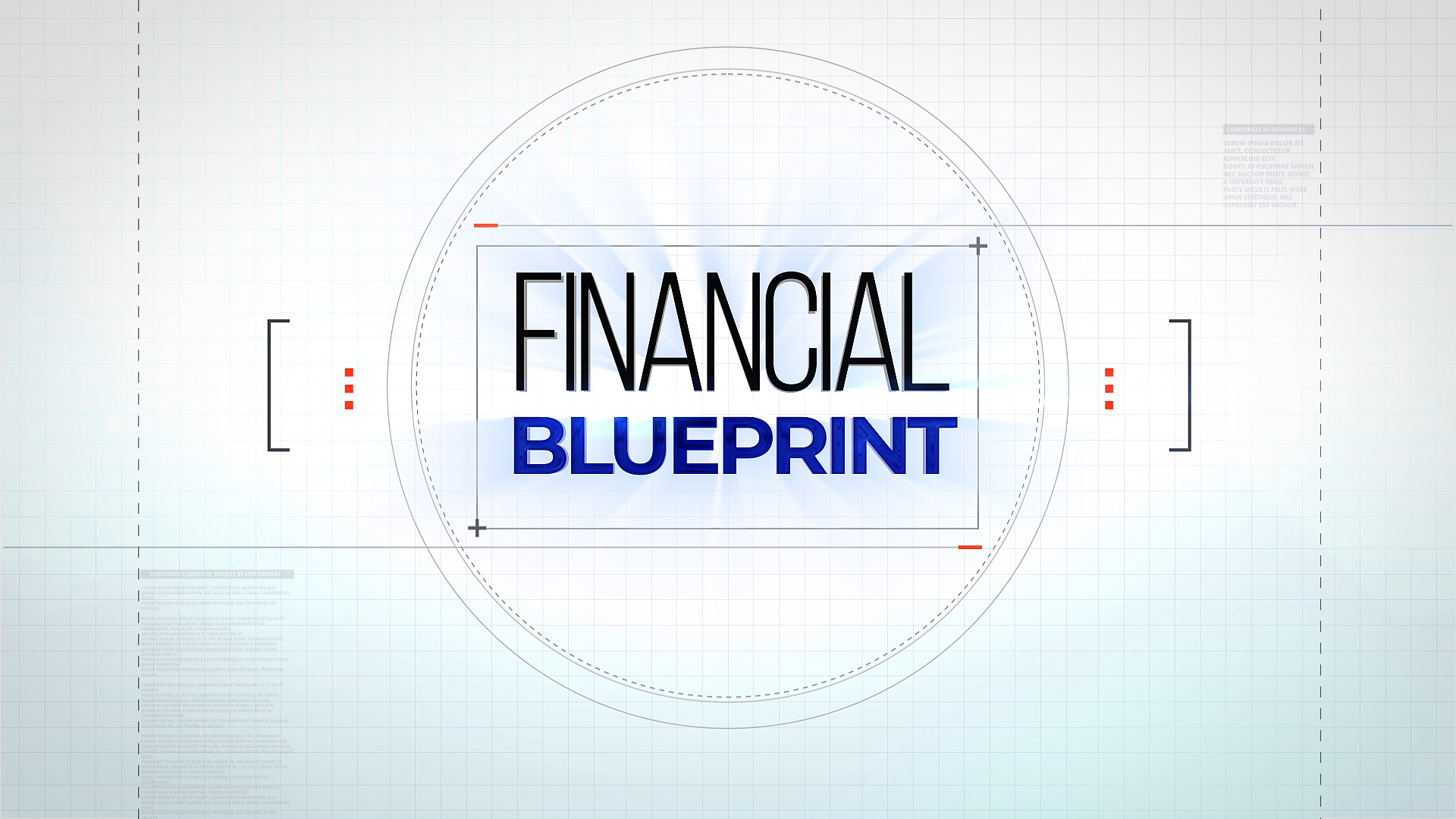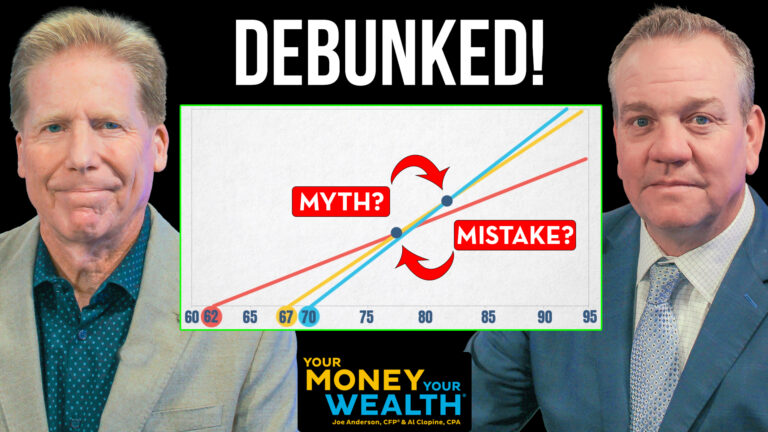Have you ever heard the term “no regrets”? It’s a good way to live your life. Unfortunately, retirees have plenty of regrets. Joe Anderson, CFP®, and Big Al Clopine, CPA show you how to avoid the biggest retirement regrets and set yourself up to retire happy and secure on this episode of YMYW TV.
Calculate your FREE Financial Blueprint
Important Points:
- 00:00 – Introduction
- 01:41 – Not saving more
- 02:46 – Not doing more planning
- 03:04 – Ignoring inflation
- 03:49 – Not factoring in healthcare expenses
- 04:35 – Claiming Social Security too early
- 06:15 – Calculate your Financial Blueprint
- 07:18 – True/False: Over 50% of retirees retired sooner than planned.
- 08:53 – Not considering taxes
- 10:51 – Asset Allocation: Not having passive income
- 12:27 – Not managing debt
- 13:31 – Relocating
- 14:50 – Calculate your Financial Blueprint
- 16:09 – True/False: Overall, Americans enjoy being retired
- 17:35 – How retirees spend their time in retirement
- 17:54 – Retiree reflections on lending money, spending, housing, boredom, marriage, health, and age
- 21:56 – Calculate your Financial Blueprint
Subscribe to Your Money, Your Wealth® on YouTube!
Transcript:
Joe: Have you ever heard the term ‘no regrets’? It’s a good way to live your life. Unfortunately, when it comes to retirees, they have plenty of them. Let’s learn what they are so you can avoid them.
Welcome to the show everyone. Show’s called Your Money, Your Wealth®. Joe Anderson here, CERTIFIED FINANCIAL PLANNER™, President of Pure Financial Advisors, big man, CPA, Big Al Clopine sitting right over there. How are you, sir?
Al: Doing great. Yourself?
Joe: You have any regrets in life?
Al: A few, mostly not though. But when it comes to retirement, a lot of people do have a lot of regrets.
Joe: Unfortunately, that is the case. But you know what? You don’t have to have those same regrets. That’s today’s financial focus. Look at this number, Big Al. 60% of people. I bet it’s probably more than that. I bet 80%. If we could get in that time machine, if you could go back in time 10, 20, 30 years, what would you do differently in regards to your overall savings? Would you save a little bit more? Would you save differently? Would you put your money in different areas from a tax perspective? I’m sure we all would, but let’s start fresh now. Let’s bring in the big man.
Al: So, regrets. Many of us have regrets in retirement. What are they? More importantly, what do we do to avoid them? And then, Joe, we’re going to talk about reflections. Retirees, that when they retired, kind of things that maybe worked or didn’t work for them, so that we don’t make those same mistakes.
Joe: Alright, well let’s get to it. 78% regret that they wish they would have saved a little bit more.
Al: Yeah, that’s a common one, right? It’s probably 90% really, but some people didn’t want to admit it. But there are some solutions, Joe. So one is if you- particularly if you’re a little bit younger, or you’ve got a few more years to before you retire, crank up that 401(k). Certainly at least make sure that you’re going up to the match, but try to do more than that. And remember, when you’re over 50, you can actually put more in that 401(k). Also Joe, you can delay retirement, you can get a part-time job, side hustle, right?
Joe: Alright, let’s get into the financial planning. 63%, Big Al, regret that they would’ve done a little bit more planning.
Al: Yeah, I guess creating a plan is something that we all kind of need to do and what does that mean? So first of all, you gotta figure out what you have. That’s net worth. That’s your assets, minus your liabilities. Take stock on what you have.
Try to figure out what you need in retirement. Take a look at your cash flow and then work backwards. Joe, just figure out how much you need to save per month to get to that goal.
Joe: Yeah, I think it’s just writing your goal on a piece of paper is the first step. What do you wanna accomplish with the money that you have? Or the cash flow that you have and then start slowly creating that overall strategy in the plan and just make sure that you update it. I mean, 63%, that’s a pretty big number. This is easy fix. Real quickly, you can do it on a napkin. Inflation, a lot of people really don’t understand inflation. 54% almost half. said you know what? It’s a regret. I didn’t really factor inflation probably as much as I should have in my overall strategy.
Al: Yeah, it’s a pretty common thing, Joe. A lot of people that we talk to, they look at what they’re spending, and then maybe they’re going to retire in 5 years or 10 years, whatever it may, and they forget to factor in inflation. Like here’s just a little example, that $50,000 of spending over the next 20 years gets up to $90,000.
Joe: It almost doubles, right, in 20 years. In a sense, $50,000 almost goes to $100,000. So you got to think, hey, the cost of goods and services that you purchased today, as you are approaching retirement, in retirement those costs are going to increase. How about healthcare expenses, right? We don’t necessarily factor in how much this is going to cost us.
Al: Yeah, I think a lot of us realize we may be spending more for health care as we retire as we get older. But a lot of us don’t necessarily plan for it. So Medicare- so over 65, 65 and over. So that’s great, but they don’t pay for everything. Just like most insurance doesn’t pay for everything. So you’ve got to factor that in. Many people want to get a Medigap policy or supplemental policy for their Medicare. And then also, Joe, you got to remember that you have to pay for Medicare as well. It usually comes out of your Social Security.
Joe: Long term care is just another issue there that costs a lot of money. So making sure that you plan for this, putting that in the overall budget. Alright, finally Al, this is fixed income here. A lot of people are like, man, I regret taking that Social Security too early.
Al: I find this interesting, Joe, because we do know most people take Social Security early. Right. And, most of you are fine with that decision, which is great. But many Joe, at least about a third of the people don’t realize if you take it before your full retirement age, which right now is 67, right? You have to give some of it back.
Joe: Yeah. Depending on what your full retirement age is, you can take it at age 62 or you can wait until age 70, really dependent on your overall strategy and plan. But as Alan just alluded to, most of you take it as soon as you can get it. Hey, I’m going to retire at 64. Guess what? The next day I’m claiming my Social Security benefits because I want that fixed income. I want the paycheck and most people don’t necessarily care about that haircut that they receive. You know, back it’s around 25% to 30% haircut, depending on when you claim your overall benefit. And that’s a permanent haircut for life. So once you reach your full retirement age, if you decide to hold off and wait, you get an 8% delayed retirement credit. So the latest that you want to claim is age 70. But if my full retirement age is age 67, 67 to age 70, each year that I wait, I get that delayed retirement credit. So it could be a bigger bang for your buck. But then still, most people don’t do this, even though it’s a lot larger benefit.
Al: Yeah, it really is. And when you look at Joe, when you look at the difference between age 62 and 70, it’s over a 70% increase, close to double, Joe, if you wait till 70, in terms of your monthly benefit.
Joe: You see any regrets there? Let’s not make them. Go to YourMoneyYourWealth.com. We got our Financial Blueprint. This is a really good tool for all of you that you can do at home, right? It’s going to give you the pros and cons of what your current strategy is and give you some ideas on how to get from point A to point B a little bit more effectively and efficiently. Go to YourMoneyYourWealth.com, click on that special offer. It’s our Financial Blueprint. All right. We got to take a break. We’ll be back.
Retirement Regrets and Solutions
Joe: Hey, welcome back to the show. Big Al and I are talking about regrets. The regrets that people had, that are currently retired. And we’re trying to help you not have those same regrets. If you need some help with that, go to YourMoneyYourWealth.com. Click on our special offer. It’s our Financial Blueprint. You want a blueprint on your financial life? Go to YourMoneyYourWealth.com. It takes a few minutes to fill out, but it’ll give you really good concrete information on steps to take to make your financial life better. It’s our gift to you. It’s free of Charge. YourMoneyYourWealth.com. Click on this special offer. It’s our Financial Blueprint. Let’s see how you did on that true/false question.
Al: Over 50% of retirees retired sooner than planned. Turns out that’s a true statement. In fact, here’s the latest stats- about 56% of you, more than half, have retired sooner than you wanted to. So how can that be? The number one reason is health reasons. Your own health. You’re retiring sooner than you wanted to. Other reasons would be your company. Maybe you’re just sick of your job or maybe you get let go. Another common one, Joe, is caregiving. And that could be for a spouse, it could be for a parent, or whatever.
Joe: Yeah, you look at the stats on that, it’s really interesting. They ask people, when do you want to retire, and when did you actually retire? Most people want to retire 67 and later, but most people retire 65 and younger.
Al: Right, yeah.
Joe: And if you take a look, right, at the workforce. There’s still a lot of people, 65+-
Al: Including me? I’m in that stat.
Joe: 65+, that are still working- educators, right? Wholesale and retail, professional and business. So a lot of times people want to work a little bit longer. If you’re lucky enough to have a job like Big Al. You could work for the rest of your life.
Al: It could be almost indefinitely. Hey, Joe, here’s another one, taxes. A lot of people don’t really consider taxation in retirement. And here’s the issue. The issue is most people’s savings is in retirement accounts. They got a tax deduction when they put the money in, but when the money comes out, it’s fully taxable. And so taxes will take a bigger part of your income than you might realize.
Joe: I would say this number is a lot larger than this because most people have a problem that they don’t know right? Until they hit retirement. Because all of a sudden, and all of the dollars that people have saved are in this tax-deferred pool. That’s a 401(k), IRA, 403(b), TSP, whatever. It’s a pre-tax contribution going in gross, tax-deferred, which is great. So all of those dollars compound. But then when it’s time to pull the dollars out, all of those are going to be taxed at ordinary income, which is not bad for a lot of people. But it really depends on how much money that you saved and what kind of lifestyle that you want to live. If you want to maintain the same lifestyle and all of the dollars are in your tax-deferred account, potentially you’re going to be in the same tax bracket. When these plans were established back in the 70s, the top marginal rates were extremely high, double of where they are today. And so it was like, get a tax deduction now, have that money grow tax-deferred. And when you pull the dollars out, you will probably be in a lot lower tax bracket. So it’s a triple whammy. It’s a triple good deal, but as tax rates go down and people are saving a lot more, you know, sometimes we see that the opposite happens. There’s RMDs. There’s a lot of restrictions when it comes to these tax-deferred accounts. So I think what people should be thinking about is a little bit more diversification. Could I get some money in a tax-free account like a Roth? Or maybe just save in a brokerage account? Or some real estate outside of my overall retirement accounts? Don’t let this be your sole, single nest egg. Think about diversification so you have flexibility when it comes time to create that income.
Al: Yeah, so important. Roth, of course, is tax-free and money is in your taxable account. If an asset grows, you hold it for at least a year, you get capital gain treatment, which is a special rate that’s about half of your regular rate. Joe, another thing people regret is, in fact over a third of people out there, regret not having investments that have enough passive income.
Joe: Yeah, but I think a couple of things people get confused and they’re like, man I wish I had more income producing investments such as like dividend stocks. We hear this quite a bit. It’s I need more dividend paying stocks because I don’t want to, you know, sell this stock. I would just like to live off the dividends. Or maybe I should buy some REITs that kick out a lot of income here, or maybe bond ladders. So these are all really good investments that will kick out income. However, there’s probably a different way, how you can create income just from like an exchange traded fund like an ETF or an index fund, right? Some people will buy annuities to get a guaranteed income. So there’s all sorts of different options. And it really depends on the investor. But if you think about it, you can create your own synthetic dividend. I know I probably shouldn’t get that deep, but you don’t have to look at, hey, I need more dividends from my stock. You can still sell shares of an ETF or an index fund or a mutual fund or an individual stock. Be careful to have too much concentration, I think in these past or these income producing type of investments. Because people need the income, they don’t necessarily know how to generate it. So they might load up here.
Al: Well, that’s such a good point. And I’ll just kind of say with an exchange trader fund or index fund, you create your own income. So total return, right? Growth and income. Growth, dividends and interest. You create your own need. So you don’t necessarily have to pay taxes on income you don’t really need, but you can have capital gains if you’re selling some of that for gains. So Joe, another regret is people haven’t managed their debt that well. And a lot of people are ending up with debt in retirement.
Joe: 40% are stating, man, I got some high risk debt here. One of the rules of thumb, you know, was like always be debt free as you roll into retirement, but that is just not the case today. So people have some high risk debt, high interest rate debt as they’re rolling into retirement, which is fine as long as you can manage it. So just understand what you have and then come up with a solid strategy on how you want to pay that off. Credit card debt, car loans, student loans, whatever that you might have. Just make sure that you document what you have and then come up with an individual strategy or a group strategy to knock it out.
Al: Yeah, snowball, avalanche. Debt management, all kinds of stuff.
Joe: Avalanche. Love the avalanche.
Al: That’s right. I guess, let’s also talk about a lot of people regret selling their home too quickly in retirement. They sell their home, they move away from their friends, maybe the life that they knew. And Joe, I think people are rushing into decisions too quickly.
Joe: Yeah, it’s like, I want to move to Italy! When I retire, I’ve never been. Let’s go. I love wine and I like pasta. I’m going to move to Italia. Or hey, I want to move to, you know, the Philippines because it’s pretty cheap or you know what? I’m going to move to Texas. I live in California, the state taxes. I hate them. I’m going to move to Texas and live there. Have you ever been to Texas in the Summer? I don’t know. I haven’t. Have you ever been to the Philippines or Italy? You want to make sure that you visit the region before you just pack up. I’m selling my place and I’m out of here. You got to look at the logistics. If you’re moving right, as Al said, hey, maybe all your social circles are right here. And if you move across the country, you know, where are your family and friends? What’s going on? You know, I think that partnership and friendship as you retire is extremely important. That sense of community versus now being isolated in a place that’s maybe cheaper to live. But you’re by yourself. I don’t know.
Al: I think a really good way to think about this is if you have an area that you want to live in potentially, then go through Airbnb or VRBO, rent a house for a month or two or 3 months, maybe different times of the year. Make sure this is really where you want to be.
Joe: All right, go to YourMoneyYourWealth.com. We got that special offer this week. It’s our Financial Blueprint. Break things down. Find out where you sit and where you need to go. YourMoneyYourWealth wealth. com. Click on that Financial Blueprint. It’s our gift to you. It’s free of charge. When we get back, we got real live quotes from all of you reflecting back on your retirement. Don’t go anywhere. You don’t want to miss.
Retirement Reflections
Joe: Show’s called Your Money, Your Wealth®. Big Al and I are just breaking things down here about some regrets that people had in retirement and how to avoid them. And now we’re going to get into some reflection of what people are thinking about, they’re looking back at their retirement.
Yeah, this is gonna be fun, but before we get to that, couple of things, go to YourMoneyYourWealth.com, click on that Financial Blueprint. It’s our special offer this week. It’s gonna give you a couple of different scores in several different areas, right? Red, yellow, green. Green, all good. Yellow uh oh, need a little bit of work. Red, a lot of work to do. It will give you an idea, at least a starting point, to say here’s the areas that we need to focus on, here’s the areas that we’re probably pretty good with. This is really good information to make sure that you don’t make mistakes or the regrets that we talked about all day. YourMoneyYourWealth.com, click on that special offer. Now let’s see how you did the true/false question.
Al: Overall, do Americans enjoy being retired? Well, of course, it’s true. 9 out of 10, 90% of you enjoy being retired, and why not? You have more free time. You can spend time with the family and whatever. But more than one out of 5 of you think the transition from working to retirement was harder than you expected.
Joe: You know, I find these statistics interesting because I would think you would be a lot less than this. 9 out of 10. I mean, most people don’t necessarily plan for their retirement. And then, if you’re not planning for like the softer side of retirement, like your purpose and what are you gonna do each day? What’s gonna get you up in the morning? What’s gonna get you excited? If you’re not planning for that, you know, you’re probably that- number one.
Al: Yeah, or more as you said. I mean, we do fine. We hear that certain people are kind of depressed the first year because their loss of identity and things like that.
Joe: Yeah, if you’re a hard charger, right, you get up early, you like to work, you get deadlines done, you like to interact with a lot of different people. Once you retire, some of your people, you know, some of the social circle, the people that you deal with on a day in and day out, might leave. Some of you might be extremely excited about that notion, right? But some of you might be like, oh man, I miss Big Al. Where’s he at? Right? So you just want to make sure that you’re prepared as you approach retirement.
Al: Well, let’s start with what are people doing in their retirement? So most of you are spending more time with your friends and family. Right on. That’s exactly what you should be doing. But spending time with hobbies, great. Traveling, great. Doing volunteer work, great. Make sure you got something, Joe, as you said, to get you out of bed every day.
Joe: Let’s go to some reflections here. Here’s a reflection. One individual said, “I’m lending money. I wish I would have dumped that deadbeat boyfriend much earlier.” So I guess what she’s supporting him. He’s sleeping on the couch, drinking beers, right? Oh, I love you so much, honey. And guess what? You know, they never got married and she probably put a lot of money, right, into the deadbeat boyfriend.
Al: That’s one you don’t want to be stuck in, right? So here’s another one, reflections on spending. “I should have spent less on stuff and more on making memories.” And I think that is so true for many of us. As we get older, we realize it’s the memories, it’s the experience that mean more than that stuff that we bought.
Joe: Speaking of stuff, here’s some reflections on housing. One retiree said, “I found owning two places was a lot of work and money.” Yeah, Big Al, you own more than one place.
Al: I do, but I love it.
Joe: Yeah, but well, how about the apartments that you owned or the condos that you owned? Someone put a motorcycle, parked a motorcycle in the-
Al: Yeah, well, that wasn’t all great. But the two houses that for me, the reason why I’ve got, I’ve had a condo in Hawaii for 20 years. It’s been great because I rent it out when I’m not there. So I’m actually making money. So that’s okay. But yeah, I bought apartments in Las Vegas. Probably at the wrong time. Wasn’t so excited about that.
Joe: So, as people retire, they might want a Winter home, Summer home. But just understand, this person thought it was a little bit hard. Big Al, he loves it. He’s got Hawaii and San Diego.
Al: Yeah, let’s talk about boredom. One retiree discovered, “I have to search out my daily activities. They don’t come looking for me.” Well, that’s true. You’re not going to work. You’re not having people tell you what to do. You’ve got to figure it out yourself. And this is where you need to take a little initiative, so that you’re not just sitting around the home.
Joe: Yeah, I mean, I’ve seen studies where some average retirees watch probably a little bit too much TV, you know, but making sure that you plan your week and whatever activities that you want to do, I think is absolutely key, because it’s not going to come finding you. You’ve got to find it.
Al: Yeah. Next one, Joe. Reflections on marriage. This one kind of cracks me up a little bit, but one retiree said this. “My husband worked for 40 years. Now he’s home all day, every day.” I guess that wasn’t such a good thing.
Joe: Yeah, he’s just rearranging the cupboards, you know, getting in her space. How about this? Mickey Mantle, a little Yankee icon. If you like MLB, he said, “Man, if I knew I was going to live this long. probably taking a little bit better care of myself.” I remember watching a little movie on Mickey Mantle and Roger Maris. They’re drinking beer, smoking cigarettes in the dugout.
Al: Yep.
Joe: What a life.
Al: I think I saw the same movie. Yeah, that was kind of old school baseball players, right?
Joe: Perfect.
Al: I remember when I was a teenager, I wanted to be a baseball player. Of course, I was never good enough, but that was the dream, right? And then I saw this study that said baseball players only live to age 57. And I went to my dad and said, gosh, they don’t live that long. Why is that? And he said, well, I think they kind of have a hard life. And I think that’s what he was talking about.
Joe: Wow. I think that stat is probably a little old now.
Al: Probably.
Joe: Cause they’re like premier athletes today.
Al: True.
Joe: Back then they were probably partying a little bit in the dug outs.
Al: Good point.
Joe: All right. You wanted Maurice Cavalier. Chevalier.
Al: Chevalier.
Joe: Maurice Chevrolet, “Old age isn’t so bad when you consider the alternative.” What’s he talking about there? Big guy?
Al: Well, you know the alternative. If you’re not alive, you’re not alive.
Joe: Well, we’re done with that. Hopefully you liked the reflections. There’s regrets. We don’t want regrets in life. Hopefully we gave you some good solutions to make sure that you don’t have any more regrets if you did. And then reflecting back on some individuals of what they should have done or could have done, maybe a little bit different when they were thinking about their overall retirement strategy. Learning from other people’s mistakes sometimes is the best way to learn. If you want more tools, go to YourMoneyYourWealth.com, click on our Financial Blueprint. Our gift to you. It’s absolutely free. It’s going to give you a couple of different scores. It’s going to say you’re on track, or hey, you need a little bit of work to do, or you need a lot of work to do, in several key areas of your financial life.
Go to YourMoneyYourWealth.com, download that Financial Blueprint. Might take you a few minutes to fill out, but it will be well worth it to get on your way to financial freedom. Okay, that’s it. That’s a wrap. That’s it for us. For Big Al Clopine, I’m Joe Anderson. We will see you next time, folks. Thanks for tuning in.
IMPORTANT DISCLOSURES:
• Investment Advisory and Financial Planning Services are offered through Pure Financial Advisors, LLC. A Registered Investment Advisor.
• Pure Financial Advisors, LLC. does not offer tax or legal advice. Consult with a tax advisor or attorney regarding specific situations.
• Opinions expressed are subject to change without notice and are not intended as investment advice or to predict future performance.
• Investing involves risk including the potential loss of principal. No investment strategy can guarantee a profit or protect against loss in periods of declining values.
• All information is believed to be from reliable sources; however, we make no representation as to its completeness or accuracy.
• Intended for educational purposes only and are not intended as individualized advice or a guarantee that you will achieve a desired result. Before implementing any strategies discussed you should consult your tax and financial advisors.
CFP® – The CERTIFIED FINANCIAL PLANNER® certification is by the CFP Board of Standards, Inc. To attain the right to use the CFP® mark, an individual must satisfactorily fulfill education, experience and ethics requirements as well as pass a comprehensive exam. 30 hours of continuing education is required every 2 years to maintain the certification.
AIF® – Accredited Investment Fiduciary designation is administered by the Center for Fiduciary Studies fi360. To receive the AIF Designation, an individual must meet prerequisite criteria, complete a training program, and pass a comprehensive examination. Six hours of continuing education is required annually to maintain the designation.
CPA – Certified Public Accountant is a license set by the American Institute of Certified Public Accountants and administered by the National Association of State Boards of Accountancy. Eligibility to sit for the Uniform CPA Exam is determined by individual State Boards of Accountancy. Typically, the requirement is a U.S. bachelor’s degree which includes a minimum number of qualifying credit hours in accounting and business administration with an additional one-year study. All CPA candidates must pass the Uniform CPA Examination to qualify for a CPA certificate and license (i.e., permit to practice) to practice public accounting. CPAs are required to take continuing education courses to renew their license, and most states require CPAs to complete an ethics course during every renewal period.










